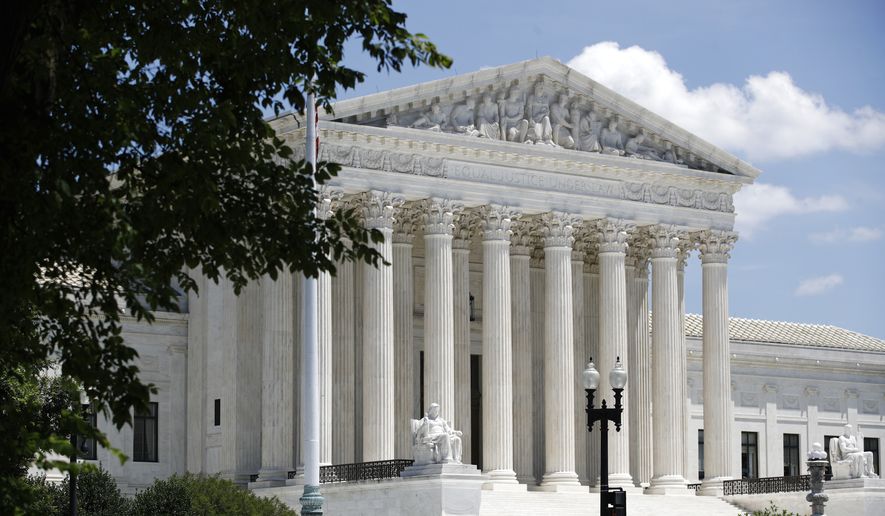The Supreme Court on Wednesday allowed Virginia to remove some 1,600 names of suspected noncitizens from its voter rolls before Tuesday’s elections.
The 6-3 ruling put on hold lower court decisions that found the state’s purge violated federal law and ordered Virginia to restore the names to its lists. The names can remain off the rolls while the case proceeds through the courts, the justices said.
It marked a major early victory for conservatives in what court watchers expect to be a tsunami of election-related cases in the coming weeks.
Virginia Gov. Glenn Youngkin, who ordered the purge, celebrated the win.
“Clean voter rolls are one important part of a comprehensive approach we are taking to ensure the fairness of our elections,” the Republican said. “Virginians can cast their ballots on Election Day knowing that Virginia’s elections are fair, secure and free from politically motivated interference.”
Alliance for Justice, a liberal advocacy group, accused the justices of “voter suppression” and said they feared how the court would rule in other election cases.
SEE ALSO: Noncitizens are on the voter rolls — nobody knows how many
“We deserve free and fair elections where voters who are qualified and registered to vote should be able to cast their ballot without any obstacles. The Supreme Court appears to disagree,” said Keith Thirion, a co-president of the group.
Mr. Youngkin ordered the purge in August.
He said the state had culled more than 6,000 noncitizens from its rolls over 30 months. His executive order directed local election officials to scour their lists daily for other noncitizens.
That led to the identification of 1,600 more names since early August.
Virginia said it relied on Department of Homeland Security records to flag more than 1,000 names. The others were flagged because they identified themselves as noncitizens at some point on state driver’s license applications or other official forms.
Those whose names were removed were sent notices giving them a chance to prove their eligibility.
Left-leaning voting rights and immigrant rights groups and the Justice Department sued. They said the purge violated a 1993 federal law that forbids any large-scale culling of voters’ names within 90 days of a national election.
Virginia argued that the law, the National Voter Registration Act, or Motor Voter, didn’t apply to removing ineligible voters such as noncitizens.
A federal district judge and the 4th U.S. Circuit Court of Appeals rejected that reasoning, saying the state had bungled the proper understanding of the law.
The case sped through the Supreme Court. Virginia asked the justices to take it on Monday and for the court to deliver its decision within two days.
“This ruling is a win for election integrity and the rule of law,” said Virginia Attorney General Jason Miyares.
All six Republican-appointed justices sided with Virginia, and the three Democratic appointees sided with the Biden administration.
The justices didn’t divulge their reasons for issuing the stay, and it’s not clear whether they disagreed with the lower courts on the 1993 law or whether they believed restoring the names so close to Election Day would be too much of a disruption.
Voting rights groups that challenged Mr. Youngkin said they know at least a few citizens whose names were purged, and they suspect many more.
Virginia is one of a series of Republican-led states that have announced major steps to cleanse noncitizens from voter rolls.
Texas, Ohio, Florida and Alabama announced major purges totaling thousands of suspected noncitizens. Meanwhile, Georgia said it scoured its lists and found just 20 noncitizens.
Election officials in California said they didn’t see any reason to attempt a purge.
The issue has gained particular salience amid the Biden border surge, though experts say the noncitizens who end up on voter rolls are usually not unauthorized migrants but rather legal immigrants.
Experts disagree on the extent of the problem. Some say it is exceedingly rare, and others argue that the true number can’t be known until California and other states do more to scour their rolls.
The case decided Wednesday is Susan Beals v. Virginia Coalition for Immigrant Rights. Ms. Beals is Virginia’s elections commissioner.
• Stephen Dinan can be reached at sdinan@washingtontimes.com.




Please read our comment policy before commenting.